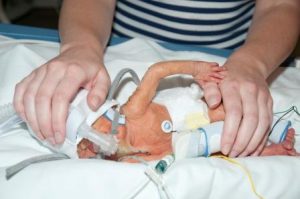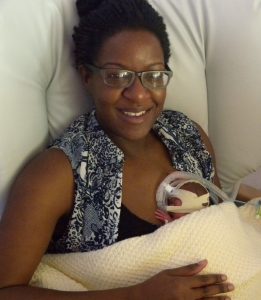Care for your baby is specialised because your baby is so small and young.
Touching and holding
At this point your baby’s skin is underdeveloped, fragile and sensitive. Baby’s also have difficulty maintaining their temperature and staying warm due to underdeveloped skin. Your baby will be nursed in a heated incubator with some humidity to help with the development if skin and to maintain their temperature.
What can you do?
- Prepare your baby for touch by speaking to them in a soft voice.
- Touch your baby slowly, gently and deliberately without making sudden movements.
- When changing your baby’s nappy be calm and gentle, try not to provide a stressful environment for your baby.
- Place your finger in the palm of your baby’s hand for them to hold.
- Containment holding – place your hands gently at your baby’s head and bottom.
- Move your hands away from your baby slowly and gently, with no abrupt movements.
- Kangaroo care and skin to skin – holding your baby may be possible depending on your baby’s condition and development, please speak to the nurse looking after your baby.

Feeding and nutrition
At this age your baby can taste and smell, however their stomach is underdeveloped. At this stage your baby will be getting all its nutrition through drips and feeding tubes. If your baby is having milk it will be a very small amount increasing very slowly. You may see your baby starting to suck on their tubes and fingers; at this point it will be useful to introduce a dummy.
What can you do?
- You should be expressing your milk as soon as possible, whether its hand expressing or from the pump. Breast milk is important for your baby as it helps build up your baby’s immunity and helps prevent infections.
- Kangaroo care and skin to skin will help with your milk production.
- Consider placing a breast pad scented of your milk during tube feeds.
- Your baby may suck on their dummy for short periods of time, it’s likely that your baby will need help keeping it in their mouth.

Sleeping
It is often difficult to tell if your baby is asleep or awake at this gestation. Generally babies will be quiet and content when they are asleep, or be active and moving when they are awake. Your baby will mainly be quiet at this age but you will notice brief periods of your baby being awake and alert.
What can you do?
- When your baby is asleep it is important to try not to wake them. Your baby will use fewer calories when sleeping which will help with growth and development.
- Avoid light directly into your baby’s eyes and try to keep quiet around your baby’s bed space.
- Before giving care to your baby, wake your baby by gently placing your hands on them.
Positioning
At this age your baby’s movement will mainly be jerks, twitches and startles. Your baby will try and stretch its arms and legs but will not yet have much control over these movements.
What can you do?
- Your baby should be nursed with boundaries around them to imitate the womb.
- Your baby should maintain a snuggled “foetal” position to facilitate emerging development of extension and flexion of their arms and legs.
- When doing cares and repositioning your baby, this must be done with slow, gentle movements without sudden changes.
Looking, listening and smelling
At this stage your baby’s eyes will open but they will not be able to focus. At this age your baby will recognise your voice and smell, however your baby’s senses will be very sensitive.
What can you do?
- Peel back the incubator cover slowly so that the light changes around your baby are gradual.
- Shield your baby’s eyes from bright or direct light.
- Avoid loud sounds and voices around your baby.
- Avoid placing visual stimulation in the incubator.
- Use a soft and quiet voice when talking to your baby.
- Protect your baby from strong odours like perfume and aftershave.
 In this section
In this section